UCL History is committed to promoting equality and diversity, and creating an inclusive environment for all staff and students. We have provided these pages to help those within the department get access to information and support that they may need whilst studying or working with us.
We are always looking for ways to make the department more inclusive, so if you have any ideas or suggestions please feel free to get in touch with Coşkun Tunçer who is our Inclusion Lead. Our EDI Committee is co-chaired by Coşkun and our student EDI Committee lead.
Our staff have participated in training including unconscious bias and harassment prevention. If you would like to report any instances of bullying, harassment or sexual misconduct, you can do so via UCL Report + Support.
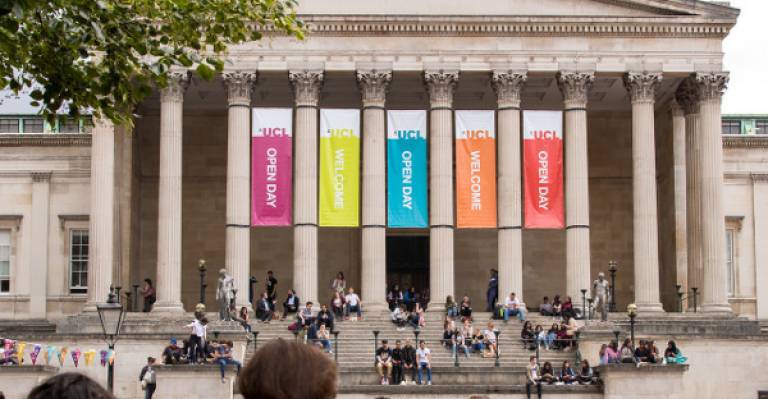
- Gender
UCL History is proud to be a department with a balanced staff and student gender profile, which also extends to our senior leadership team.
UCL History is currently working on an application for an Athena Swan bronze award. In addition to working on the application itself, the department's Athena Swan committee is working towards a variety of practical actions to improve gender imbalances within the department.
More information about college-wide gender equality policies can be found here. This page includes details about female role models; parental leave and other leave; pregnancy; gender equality network; male allies and parents and carers networks.
If you would like to report an instance of bullying, harassment or sexual misconduct, you can do so via UCL Report + Support.
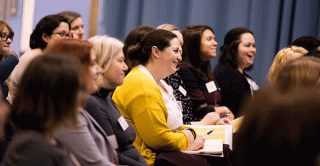
- Race
UCL History is committed to being a place where everyone feels welcome, including all individuals who join the department from Black, Asian and Minority Ethnic (BAME) backgrounds. Our students come from a variety of different countries, cultures and backgrounds.
In June 2020 we launched our UCL History Black and Minority Ethnic (BAME) Network. You can read more our mission statement for this and find out how to get involved here. Students and staff can also learn more about the History BAME Network Community here.
Senior members of the department are involved in national projects to improve diversity in the Higher Education sector. UCL History's Professor Margot Finn, who is President of the Royal Historical Society, is a contributor to the Higher Education Policy Institute (HEPI) Report, "The White Elephant in the Room: Ideas for Reducing Racial Inequalities in the Higher Education Sector". You can read the report here. UCL History's EDI committee is currently putting together an action plan that will incorporate recommendations made by this report.
As a department, we aim also to offer a diverse curriculum ensuring that the histories of various cultures and backgrounds are represented.
More information about college-wide BAME initiatives can be found via the central Race Equality web pages here, where you will find information on UCL's race equality charter; race equality steering group; BME academic and professional mentoring schemes; BME networks and societies; BME attainment and information on how to report racial and xenophobic harassment.
UCL History operates a zero tolerance policy on any form of racial abuse or harassment. If you would like to report any instances of bullying, harassment or sexual misconduct, you can do so via UCL Report + Support.
- LGBTQ+
The LGBTQ+ Equalities Action Group (LEAG) and the LGBTQ+ staff social network (Out@UCL) meet twice a term, at least. Staff at UCL can become a Friend of Out@UCL. If you'd like to become an LGBTQ+ ally, training is available here. More information on UCL supporting trans and non-binary staff in the work place can be found here.
In August 2020 UCL History launched the History LGBTQ+ Network - if you'd like to get involved or find out more please email history.lgbtq@ucl.ac.uk.
If your research is related to LGTBQ+, gender, sexuality or queer theory, then you may be interested in qUCL, which is a college-wide initiative that brings together staff and students who research these fields.
LGBT+ students can find information from the support and well-being service here. Information relevant to the trans community can be found here, including information for students who have, are currently, or are considering transitioning gender.
If you would like to report any instances of bullying, harassment or sexual misconduct, you can do so via UCL Report + Support.
The LGBTQ+ Students' Network supports students in a variety of ways.
Facebook: https://www.facebook.com/UCLLGBT/
Instagram: @ucllgbt
Twitter: UCL LGBT+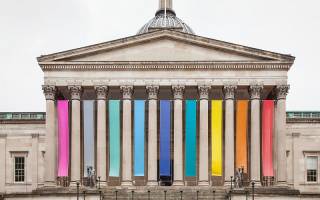
- Support and Wellbeing
University is a wonderful place, but it can also be stressful, and staff and students can face many challenges. The UCL support and well-being team are experts in their field, and can provide advice and support on issues relating to well-being; disability and mental health, in a non-judgemental and safe space.
You can access the website here, where you can find information on a variety of topics including (but not limited to):
- Health care
- Sexual consent online training
- Staying safe
- Mental health and well-being
- Disability support
- Misconduct on campus
- Concerns about a students and crisis support

- Family Friendly Working
UCL History is committed to supporting staff and students with caring responsibilities to successfully manage their work-life balance. We do our best not to timetable meetings before 10am, or after 4pm, in order to keep early morning and evening free. There are also a variety of leave and maternity/paternity options offered by UCL as a whole:
Leave Options
- Work Life Balance Policy
- Annual Leave Policy--full time employees
- Annual Leave Policy--part time employees
- Carer's Leave Policy
Maternity and Paternity Benefits
You may also be interested in getting involved with the UCL-wide Parents and Carers Society.
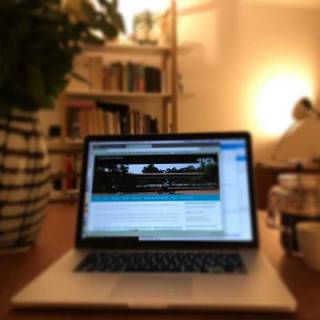
- Disability
Support for students with a range of conditions and difficulties can get support from the Student Disability Services. If you have any questions, please email disability@ucl.ac.uk or call +44 (0)20 7679 0100. The head of Student Disability Services is Venitia Stoby - you can contact her directly at v.stoby@ucl.ac.uk.
UCL Student Disability Services run a drop-in service, Monday to Friday. More information about this, and all disability services, can be found here.
If you would like to report any instances of bullying, harassment or sexual misconduct, you can do so via UCL Report + Support.
The Disabled Students’ Officer is the UCLU contact for disabled students.
- Harassment and Bullying
Students
UCL, as part of its commitment to equality and diversity, believes that every student has a right to work and study in an environment which encourages harmonious relationships. UCL is committed to preventing harassment and bullying and its commitment to equal opportunity is enshrined in the principles on which it was founded. You can read UCL's full policy on bullying and harassment here (this also includes definitions).
If you would like to report any instances of bullying, harassment or sexual misconduct, you can do so via UCL Report + Support.
Staff
UCL is committed to providing a working environment for all staff that is free from any form of bullying or harassment. All staff should expect to be treated with dignity and respect, at all times. You can read UCL's full Dignity at Work statement here.
If you would like to report any instances of bullying, harassment or sexual misconduct, you can do so via UCL Report + Support.

- Staff Journeys
UCL History is a diverse and inclusive department and our 'Staff Journeys' series highlights the different experiences and interesting routes that our historians have taken to get to where they are.
Staff Journey: Professor Eleanor Robson
Staff Journey: Dr Jagjeet Lally
Staff Journey: Dr Rebecca Jennings
Staff Journey: Professor Stephen Conway
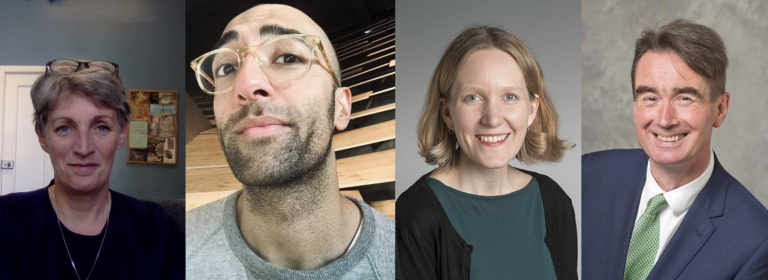
- History Networks
In August 2020 UCL History launched 3 new staff/student networks as part of our mission to promote inclusivity. The networks will hopefully provide a space in which staff and students at all levels will be able to meet new people, support each other, organise events and potentially feed into the wider culture of the department by developing conversations around how we can create a more inclusive environment. Below are the contact details for each network:
BAME Network
Staff Facilitator: Lily Chang
Student Facilitator: Su Wen Liew
Website: https://www.ucl.ac.uk/history/ucl-history-black-asian-and-minority-ethnic-bame-network
Email: history.bame@ucl.ac.uk
UCL History BAME Network Student Community (UCL staff and students): https://www.ucl.ac.uk/history/equality-diversity-inclusion/ucl-history-bame-network-mentors
LGBTQ Network
Staff Facilitator: Rebecca Jennings
Student Facilitator: Gursi Dhillon and Daniel Pickton-Allen
Email: history.lgbtq@ucl.ac.uk
Living at Home Network
Staff Facilitator: Anna Maguire
Student Facilitators: Keira Blasse, Alishba Gabol and Siyam Mohammad.
Email: anna.maguire@ucl.ac.ukInternational Student Network
Staff Facilitator: Mitchell Robertson
Student Facilitator: Guye Dai
Website: https://www.ucl.ac.uk/history/international-students-network-ucl-history
Email: history.international@ucl.ac.uk
If you would like to speak to someone about establishing any further networks, please get in touch with Coşkun Tunçer.You may also be interested in getting involved with the UCL-wide Parents and Carers Society.
- LGBT+ History Month 2021
Review the content put together by our staff and students for LGBT+ History Month 2021.
- LGBT+ History Month: Resources as Recommended by our Staff and Students
- Event - How to do LGBTQ+ History - 10 February 2021, 5:30pm
- Dr Florence Sutcliffe-Braithwaite discusses 'Queer Histories and the Trial of Oscar Wilde' - watch alongside the drama-documentary 'The Trial of Oscar Wilde' (1960), available via the BFI here.
- Black History Month 2021
- UCL History chats to Dr Brahima Kaba, Julius NYÉRÉRÉ University, about Black History Month
- Updated Black History Resources Page.
- Event - Black History Month: 'The Agronomist' Film Discussion with Professor Matthew Smith
- Event - Black History Month: 'Guess Who’s Coming to Dinner' Film Discussion with Professor Melvyn Stokes
- UCL History student Shelby de Rond highly commended entrant to the Global Undergraduate Awards for the essay ‘Agency Within Motherhood: Exploring how Enslaved Women in the Middle Passage and Colonial Latin America Raised Children and Constructed Avenues to Freedom.’
- Black History Month 2020
October is Black History Month in the UK. For Black History Month 2020, our staff and students celebrated with interviews, articles, videos and radio appearances! You can see a summary below of what we got up to:
- Black History Resources Page.
- Professor Matthew Smith discusses Jamaican poet Louise Bennett Coverley (aka Ms Lou).
- Dr Jagjeet Lally discusses Early Modern Afro-Indians.
- Dr Benedetta Rossi tells the story of former slave, Tadoutchi.
- Student Guye Dai discusses Stonewall hero Marsha P. Johnson.
- UCL History students Adila & Britney offer their reflections as students studying Black History at university; both were students in the 2nd-year undergraduate Research Seminar Black Atlantics in the Global South in the 2019-2020 cohort. Read the article here.
- You can hear Dr Tim Gibbs being interviewed on Voice of Islam and Radio France Internationale.
- We chat to UG student Luigi Muci whose essay 'Infamous Bondage': Comparing European and African Visions of Slavery in the 16th and 17th century Black Atlantic' was selected as a Highly Commended Entrant in the History category of The Global Undergraduate Awards. We discussed why Luigi chose this topic and why he thinks Black History Month is so important. Read the interview here.
- Black History Month 2019
- Black History Month: An Interview with Professor Matthew Smith, incoming Director of the Centre for the Study of the Legacies of British Slave-Ownership
- Black History Month: Montaz Marche, History MA Graduate & Researcher in Black Feminist History
- Uncovering Black Women in Eighteenth- and Nineteenth-Century Britain
- Black History Month: An Interview with Dr Tim Gibbs, Lecturer in African History
- Some lesser-known figures from recent African History: who they are & why you should know about them
- Black History Month: An Interview with Dr Ali Bennett, recently completed PhD candidate
 Close
Close

